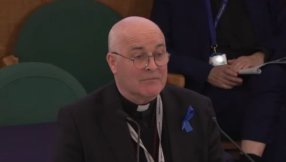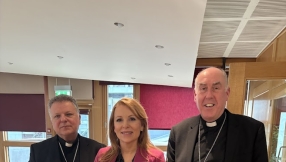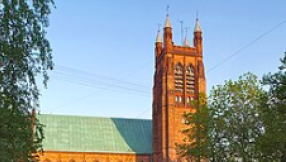
The Church of England's parliament has backed proposals to permit blessings for same-sex couples.
An amended motion containing the proposals was passed by Synod on Thursday after more than eight hours of debate.
In addition to proposing same-sex blessings, the motion invited Synod to "lament and repent of the failure of the Church to be welcoming to LGBTQI+ people and the harm that LGBTQI+ people have experienced and continue to experience in the life of the Church".
It was amended to include reassurances that the Church will not change its doctrine on marriage - the only amendment out of many put forward to have the support of the bishops and to be passed by Synod.
The vote on the main motion as amended was divided by houses and passed in all three:
Bishops: 36 for, 4 against, 2 abstentions
Clergy: 111 for, 85 against, 3 abstentions
Laity: 103 for, 92 against, 5 abstentions
The House of Bishops will now spend the next few months refining the 'Prayers of Love and Faith' and preparing new pastoral guidance which will address matters like celibacy before bringing the proposals back before the General Synod in July.
Addressing Synod after the main motion was passed, the Bishop of London, Sarah Mullally, said that the deliberations had been "difficult and costly" for many Synod members, as she appealed for continued unity.
Speaking during Thursday's debate, the Archbishop of York, Stephen Cottrell, said that the prayers were optional.
"No one has to offer these services and no one will be disadvantaged if they don't," he said.
The motion was backed by the Archbishop of Canterbury, Justin Welby, who told Synod yesterday that he was supporting them "not, I think, because I'm controlled by culture but because of Scripture, tradition and reason evidenced in the vast work done over the last six years so ably, by so many".
The carried amendment was put forward by Rev Andrew Cornes, from the Diocese of Chichester, who said that while Jesus was "radically inclusive" he was also "radically conservative" on the subject of sexuality and marriage.
"As followers of Jesus, the Church's Lord, we must lovingly welcome all who enter our doors," he said.
"We can joyfully offer prayers to those who want to live sexually celibate lives but surely, painful as this will be to some of us, we cannot bless a relationship which in its sexual aspect Jesus calls sinful.
"This has always been the Church of England's teaching and we owe it to all - and above all to Christ - to say that this teaching has not changed."
The Bishop of Truro, Philip Mounstephen, said that he felt a degree of "discomfort" in supporting the amended motion but was doing so because it enabled him to "hold on, not always comfortably, both to my twin commitments to the doctrine of marriage and the unity of the Church".
"I do feel doctrinally tethered and more than that, I believe passionately in the doctrine of marriage as we have received it. I do not think it's antediluvian or obscurantist or intentionally excluding. Rather, as we proclaim, it enriches society - to say nothing of its deep sacramental significance," he said.
Strongly opposing the amended motion, Temitope Aiwo, from the Diocese of London, said that the changes may be "too costly" for the rest of the Anglican Communion.
"I am deeply concerned that the direction of travel is one that is leading to an abandonment of confidence in the witness, the authority and the truth of God's word, in essence moving the Church of England away from her historic formularies," he said.
On Wednesday, evangelicals urged Synod to abandon the plans. Among them was Vaughan Roberts, Rector of St Ebbe's, Oxford, who said that a mediated settlement would be required for those with a conservative view of marriage and sexuality.
Ecumenical guest, the Orthodox Archbishop of London, Archbishop Angaelos, warned that the outcome would have implications "far beyond" the Church of England, and that the distinction between a blessing and holy matrimony will "not be readily understood by many around the world" but rather "sound like a mere technicality".
Another invited guest, the Archbishop of the Province of Alexandria, Samy Fawzy Shehata, urged the Church of England not to cross the "red line" of blessing same-sex unions.
"I cannot imagine that today we can understand Jesus' teaching better than the apostles and the early church," he said.
"In our understanding of marriage and sexuality, there is a red line we will never cross. Crossing this line of blessing same-sex unions will alienate 75 per cent of the Anglican Communion and endanger the ecumenical and interfaith dialogue.
"This shift in practice will lead eventually to impaired and broken communion.
"We inherited the traditional orthodox faith of the Church of England so please, please do not surrender your unique position as the mother Church of the Anglican Communion. It is your choice."













